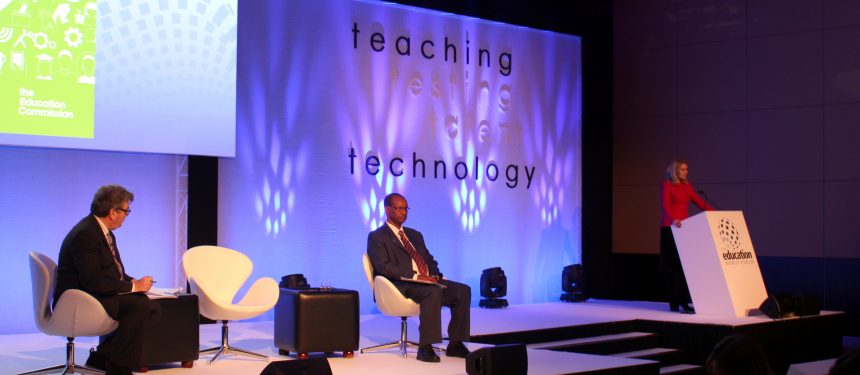The world is in danger of falling short of the UN’s Sustainable Development Goal of ensuring all children receive a quality education by 2030 unless governments worldwide take decisive action on education spending, the high-level International Commission on Financing Education Opportunity has warned.
News and business analysis for Professionals in International Education
Have some pie!
New financing compact needed to avert learning crisis, urges Education Commission
 Education Commission leader Helle Thorning-Schmidt and Ethiopia’s education minister, Tilaye Gete, spoke about the Learning Generation report at the Education World Forum this week in London. Photo: The PIE News/
Education Commission leader Helle Thorning-Schmidt and Ethiopia’s education minister, Tilaye Gete, spoke about the Learning Generation report at the Education World Forum this week in London. Photo: The PIE News/ The Education Commission has called for low- and middle- income countries to boost spending on education from 4% to 5.8% of GDP, and for the establishment of a Multilateral Development Bank investment mechanism to mobilise additional funds from the international community to support the development of quality education.
“We are in the midst of an education crisis, and we are running behind on our promise to provide education to all the world’s children,” said Helle Thorning-Schmidt, former prime minister of Denmark and one of the leaders of the commission, presenting the Learning Generation report at the Education World Forum yesterday.
“International finance should be available for all countries that need it”
The SDGs aim to have all of the 263 million children out of school worldwide in school by 2030. However, public investment in education worldwide has flatlined, and as few as four out of every 10 school-aged children in low- and middle-income countries could be on track to gain basic secondary level skills if current trends continue, the report warns.
The Learning Generation report calls for developing countries, donors and multilateral institutions to sign a Financing Compact to raise the funds to undertake much-needed reform to avert a looming “learning crisis”.
It lays out four ‘transformations’ making up this compact, which target performance, innovation and inclusion across education systems, underpinned by a new model for financing education.
The first transformation calls on leaders to strengthen results-driven education systems by setting national standards and monitoring progress; the second is to foster innovation, both through harnessing technology, improving infrastructure and strengthening the workforce which includes paying teachers a living wage.
The third objective focuses on inclusion, noting that on average, 46% of public education resources in low-income countries is allocated to educate the top 10% most educated students.
Countries must therefore prioritise learning for poor children and early years education, the report urges, as well as tagging other areas that impact children’s access to education, including health care and child marriage.
Underpinning all these objectives, the Education Commission has called for developing countries, donors and multilateral institutions to sign a Financing Compact to raise the funds to undertake much-needed reform.
The compact includes boosting domestic public expenditures on education from an estimated $1tn in 2015 to $2.7tn by 2030 in low- and middle- income countries. This would require public education spending to climb by 7% annually.
However, the report acknowledges that low-income countries will not be able to reach these goals without the support of the international community – encompassing governments, financial institutions, businesses and philanthropists.
“These are very huge amounts of money; but by investing in education now, we will also create huge benefits”
International financing for education from these sources will need to skyrocket from $16bn to $89bn per year by 2030, the report calculates.
“International finance should be available for all countries that need it, but should be prioritised according to where needs are greatest and where commitment to reform is demonstrated,” it states.
One way of collecting these additional funds is through an “Education Giving Pledge” encouraging high net worth individuals to make a “substantial public commitment” to education and motivate their peers to join them, the report proposes.
It also urges countries that provide overseas aid in the form of Official Development Assistance to allocate a larger share of GDP to ODA, and to increase the portion earmarked for education – 15%, up from the current 10%.
The commission has also outlined a bold initiative to establish a Multilateral Development Bank investment mechanism for education, to encourage MDBs to “prioritise and innovate in education”.
It would aim to ensure 15% of MDB financing goes towards education, as well as to leverage MDBs’ capital bases in a more effective way.
Such a mechanism could mobilise as much as $20bn from MDBs annually by 2030 – around six times the current $3.5bn a year.
It would also incorporate a fundraising arm to tap bilateral donors, philanthropists, and charitable organisations for additional funds on top of this $20bn, the report proposes.
“These are very huge amounts of money; but let’s not forget that by investing in education now, we will also create huge benefits,” Thorning-Schmidt noted.
One dollar invested in an additional year of schooling low-income countries generates $10 in financial benefits, according to the report.
In contrast, unless governments take decisive action, this “learning crisis” will also significantly slow progress towards another of the Sustainable Development Goals to end extreme poverty, the report warns.
Ethiopia’s State Minister of General Education, Tilaye Gete, said the Learning Generation agenda is a “huge opportunity for dramatic change”.
Ethiopia is one of a group of pioneer countries that are championing the agenda, which also includes Uganda and Mozambique.
Still looking? Find by category:


